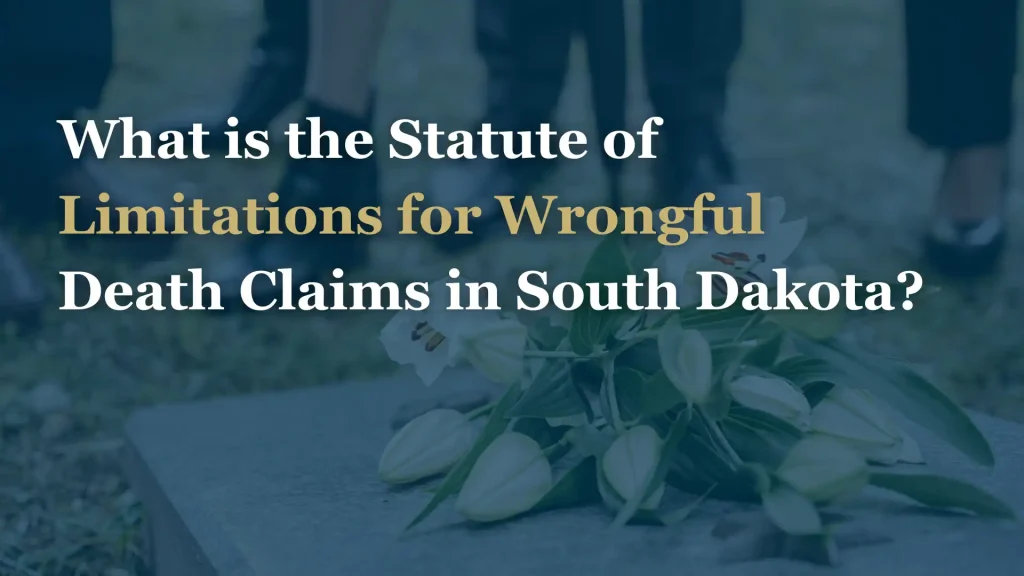 Losing someone you love because of another person’s actions can turn your world upside down. You may feel hurt, confused, and unsure of what comes next. If someone else causes that death through a wrongful act, South Dakota law gives surviving families the right to take legal action. Still, it’s essential to understand the Statute of Limitations for wrongful death in South Dakota, as waiting too long could cost you that right.
Losing someone you love because of another person’s actions can turn your world upside down. You may feel hurt, confused, and unsure of what comes next. If someone else causes that death through a wrongful act, South Dakota law gives surviving families the right to take legal action. Still, it’s essential to understand the Statute of Limitations for wrongful death in South Dakota, as waiting too long could cost you that right.
A wrongful death claim can help hold the responsible person or company accountable. It can also help your family recover money for funeral costs, lost income, and other damages. However, you must act quickly. The deadline for filing is called the statute of limitations for wrongful death in South Dakota, and knowing who can sue under this law is just as important; typically, a close family member or legal representative.
What Is the Statute of Limitations for Wrongful Death in South Dakota?
South Dakota law gives families three years from the date of death to file a wrongful death claim. This rule is found under South Dakota Codified Laws § 21-5-3. This civil lawsuit deadline applies to most wrongful death cases caused by negligence, recklessness, or intentional harm.
When Does the Clock Start?
In most cases, the clock starts ticking on the date of death. However, some cases involve delayed discovery. For example, a medical mistake might not appear until weeks or months later. In these situations, the court may consider the date of discovery instead. This applies in exceptional cases where the family could not reasonably know what caused the death right away.
Always Confirm with an Attorney
Although the law sets a three-year filing limit, some details can affect your deadline. An attorney can review your case and confirm the correct timeline. Waiting too long can erase your right to file, even if your case has strong facts.
Why the Statute of Limitations Matters
The statute of limitations doesn’t just mark a deadline. It shapes your case in other ways, too. Filing too late can shut the door on your claim, no matter how serious the harm. Understanding this deadline helps you act quickly and protect your family’s right to seek justice.
What Happens If You Miss It?
If you miss the deadline, the court may dismiss your case. That means you lose your chance to hold the other party responsible. Even if they admit fault, you will have no leverage to force them to pay compensation after the deadline for filing a lawsuit passes.
Evidence Becomes Harder to Find
Time can erase essential facts. Memories fade. Paperwork disappears. Witnesses move away or forget key details. Waiting too long may hurt your chances of gathering strong wrongful death claim evidence.
Insurance Companies Take You Less Seriously
The sooner you file, the more pressure you place on the at-fault party. Filing on time helps show that your case matters. Insurers respond differently when they know you can still take the case to court.
Exceptions and Special Circumstances
Some wrongful death cases involve special rules. Courts may make limited exceptions depending on who the claim involves or how the case unfolds. These exceptions ensure fairness when unusual situations affect how or when a claim can be filed.
Claims Involving Minors
If a minor stands to receive compensation, such as a child who lost a parent, the timeline may pause or “toll” until the child turns 18. This gives them a fair chance to recover their debts once they become adults. During this time, the court protects the child’s legal rights until they can act on their behalf.
Delayed Discovery
In cases like medical malpractice, families may not know what caused the death right away. If a hospital hides a mistake or mislabels a cause of death, the time limit may begin later. Courts decide on a case-by-case basis whether to allow extra time.
Fraud or Concealment
The court may extend the time limit if the person responsible hides their actions or misleads investigators. This rule protects families from losing their rights due to dishonesty or delay tactics. Proving fraud or concealment often requires detailed records, witness statements, or evidence of deliberate deception.
Who Can File a Wrongful Death Lawsuit in South Dakota?
In South Dakota, only the personal representative of the deceased person’s estate can file the wrongful death lawsuit. This person may be named in a will, or the court may appoint someone if needed.
Who Gets the Money?
Even though the personal representative files the case, the money awarded goes to the surviving family members. This may include:
- A spouse
- Children (including adopted children)
- Parents
- Other financial dependents
How Courts Divide the Money
The court looks at each family member’s relationship to the person who died. Then it decides how to split the award. If several people rely on that person for income or support, they may each receive a share.
What Types of Compensation Can Be Recovered?
 Wrongful death lawsuits cover both financial and personal losses. The law tries to make up for the harm the family experiences because of the loss of their loved one. Financial compensation, called economic damages, is money for losses with clear dollar amounts. They may include:
Wrongful death lawsuits cover both financial and personal losses. The law tries to make up for the harm the family experiences because of the loss of their loved one. Financial compensation, called economic damages, is money for losses with clear dollar amounts. They may include:
- Funeral and burial costs
- Medical bills related to the person’s final care
- Lost wages or income
- Loss of future financial support
Families must show records to support their cause of action. This may include pay stubs, tax returns, and medical bills.
In addition, families can recover compensation for their intangible personal losses. This includes money for:
- Pain and suffering the deceased victim experienced before death
- Loss of companionship or guidance for family members
- Emotional and mental distress caused by the death
These losses matter. You may use counseling records, journals, or personal statements to show the full impact of your loved one’s loss. The court may award punitive damages in rare cases involving gross negligence or intentional harm. These damages go beyond compensation. They send a message that certain behavior deserves punishment.
Speak with a South Dakota Wrongful Death Attorney to Protect Your Rights
Every day matters when you’re filing a wrongful death claim in Watertown. Waiting too long can cost you your case, even if your loss is real and the facts are on your side. Understanding the statute of limitations for wrongful death in South Dakota helps you act immediately. Call Turbak Law Office, P.C. at 605-886-8361. Our team can meet with you for a free consultation at your earliest convenience to get started and help you.
Related Post
Not at Fault? Here’s What You Can Ask for in a Car Accident Settlement
Did Your Insurance Fail to Cover an Accident With an Uninsured Driver?